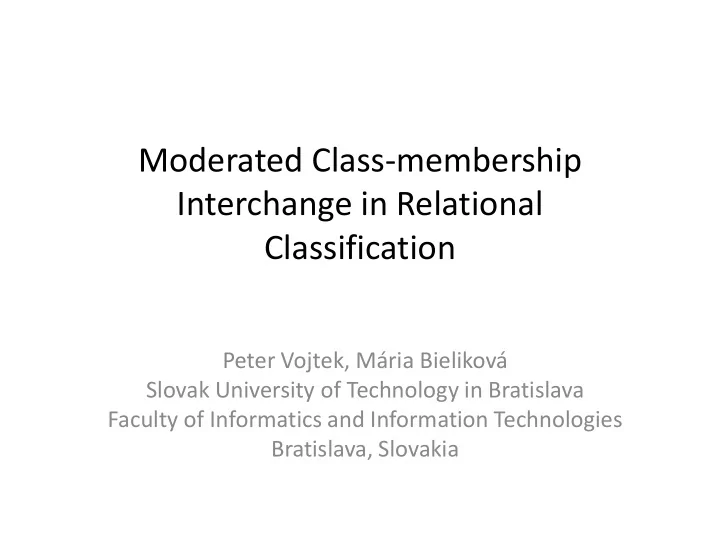

Moderated Class-membership Interchange in Relational Classification Peter Vojtek, Mária Bieliková Slovak University of Technology in Bratislava Faculty of Informatics and Information Technologies Bratislava, Slovakia
Relational (collective) classification Sort new scientific articles into two classes : • articles concerning Hardware • articles concerning Software
Relational (collective) classification Sort new scientific articles into two classes : • articles concerning Hardware • articles concerning Software article text
Relational (collective) classification Sort new scientific articles into two classes : • articles concerning Hardware • articles concerning Software article keyword author � text
Relational (collective) classification Sort new scientific articles into two classes : • articles concerning Hardware • articles concerning Software article keyword author � relation: relation: hasKeyword hasAuthor text
Relational (collective) classification Sort new scientific articles into two classes : • articles concerning Hardware • articles concerning Software article keyword author � relation: relation: hasKeyword hasAuthor text relation: references
Collective Inferencing • classmembership of each instance is initialized – Article No.1: [Hardware: 80%, Software: 20%] – Article No.2: [Hardware: 50%, Software: 50%]
Collective Inferencing • classmembership of each instance is initialized – Article No.1: [Hardware: 80%, Software: 20%] – Article No.2: [Hardware: 50%, Software: 50%] • neighbouring instances share and update their • neighbouring instances share and update their classmemberships • iterative, convergent process • at the end – Article No.1: [Hardware: 91%, Software: 9%] is assignet to class Hardware
Mis classification real class initial classmembership final classmembership HW 70% HW 80% HW SW 30% SW 20% article article article Naïve collective inference Bayes
Mis classification real class initial classmembership final classmembership HW 70% HW 80% HW SW 30% SW 20% article article article Naïve collective inference Bayes HW 55% HW 30% HW 30% HW HW SW 45% SW 45% SW 70% article article article
Mis classification real class initial classmembership final classmembership HW 70% HW 80% HW SW 30% SW 20% article article article Naïve collective inference Bayes HW 55% HW 30% HW 30% HW HW SW 45% SW 45% SW 70% article article article HW 40% HW 30% HW SW 60% SW 70% article article article
real class initial classmembership final classmembership HW 70% HW 80% HW SW 30% SW 20% article article article Naïve collective inference Bayes HW 55% HW 30% HW SW 45% SW 70% article article article HW 40% HW 30% HW SW 60% SW 70% article article article HW 70% HW 40% HW SW 30% SW 60% article article article
real class initial classmembership final classmembership HW 70% HW 80% HW SW 30% SW 20% article article article Naïve collective inference Bayes HW 55% HW 30% HW SW 45% SW 70% article article article HW 40% HW 30% HW SW 60% SW 70% article article article HW 70% HW 40% HW SW 30% SW 60% article article article
real class initial classmembership final classmembership HW 70% HW 80% HW SW 30% SW 20% article article article Naïve collective inference Bayes HW 55% HW 30% HW SW 45% SW 70% article article article HW 40% HW 30% HW SW 60% SW 70% article article article HW 70% HW 40% HW SW 30% SW 60% article article article
real class initial classmembership final classmembership HW 70% HW 80% HW SW 30% SW 20% article article article Naïve collective inference Bayes HW 55% HW 30% HW SW 45% SW 70% article article article HW 40% HW 30% ? HW SW 60% SW 70% article article article HW 70% HW 40% HW SW 30% SW 60% article article article
real class initial classmembership final classmembership HW 70% HW 80% HW SW 30% SW 20% article article article Naïve collective inference Bayes HW 55% HW 30% HW SW 45% SW 70% article article article HW 40% HW 30% ? HW SW 60% SW 70% article article article HW 70% HW 40% HW SW 30% SW 60% article article article
Information Exchange Moderation • Classmembership is evaluated using entropy HW 100% – great value : [hardware: 100%, software: 0%] SW 0% – worthless: [hardware: 50%, software: 50%] accept ignore 50 : 50 0 : 100 hardware : software
Information Exchange Moderation • Classmembership is evaluated using entropy – great value : [hardware: 100%, software: 0%] – worthless: [hardware: 50%, software: 50%] threshold moderation accept ignore 50 : 50 0 : 100 hardware : software
Information Exchange Moderation • Classmembership is evaluated using entropy – great value : [hardware: 100%, software: 0%] – worthless: [hardware: 50%, software: 50%] linear continuous moderation accept ignore 50 : 50 0 : 100 hardware : software
Experimental Evaluation • MAPEKUS dataset http://mapekus.fiit.stuba.sk • two accuracy values are compared : – accuracy after initialization (naïve Bayes based on text of article’s abstract) (naïve Bayes based on text of article’s abstract) – accuracy after collective inferencing
Experimental Evaluation 10 Initialization: 8 • 80% accuracy y Gain [%] Collective inferencing: 6 • 89% accuracy Accuracy G 4 ACM classes: General 2 Literature Software 0 Data -2 0,5 0,55 0,6 0,65 0,7 0,75 0,8 0,85 0,9 0,95 1 Direct class No moderation Moderation Threshold Assigment only
Experimental Evaluation 10 Initialization: 8 • 80% accuracy y Gain [%] Collective inferencing: 6 • 89% accuracy Accuracy G 4 ACM classes: General 2 Literature Software 0 Data -2 0,5 0,55 0,6 0,65 0,7 0,75 0,8 0,85 0,9 0,95 1 Direct class No moderation Moderation Threshold Assigment only accept ignore
Conclusions • new method to increase robustness of relational classification • succesfully evaluated on – MAPEKUS dataset – MAPEKUS dataset – (Netflix+IMDB) movie recommendation • further work: – different shapes of moderation function – shift to homophily
Recommend
More recommend